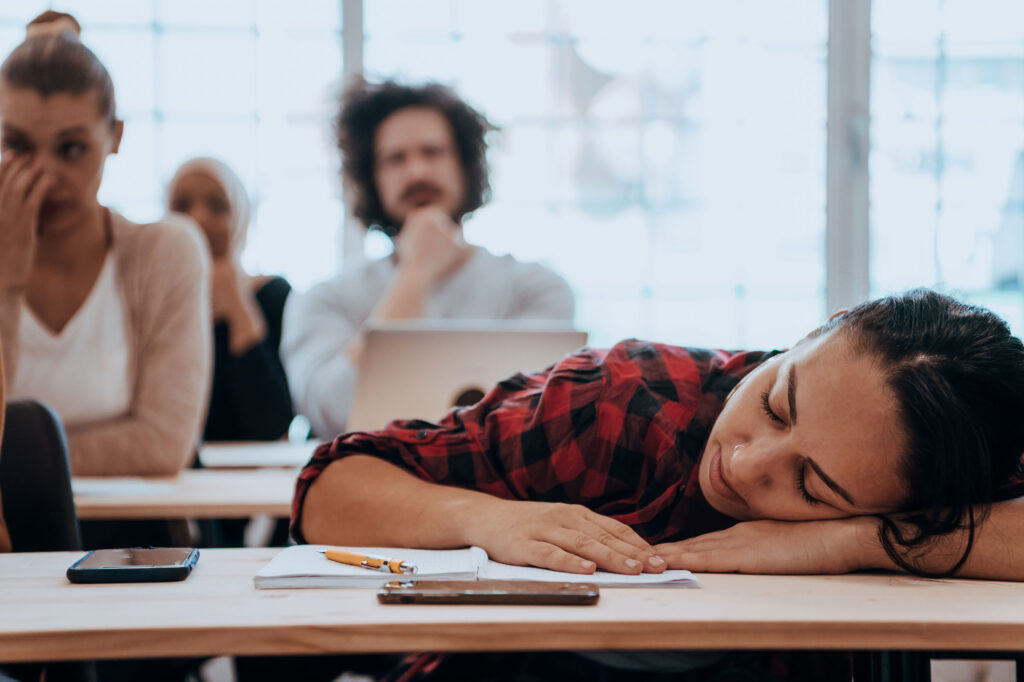Going to school while coping with a hypersomnia
such as idiopathic hypersomnia, narcolepsy, or Kleine-Levin syndrome

such as idiopathic hypersomnia, narcolepsy, or Kleine-Levin syndrome
Participants at the 2015 Atlanta HF Conference included K-12 and college students and their families. Conversations with, feedback from, and comments by students and their loved ones brought to light unmet educational needs across grade levels for information, direction, and support. Shortly thereafter, educator and HF Board Member Mary A. King, EdD, launched a two-pronged approach to meet those needs for students in K-12 and Higher Education.
Education Essentials for Students With Idiopathic Hypersomnia consists of two series of guides developed under the oversight of Prof. King and introduced during a panel discussion at the Boston 2017 Conference via a PowerPoint Presentation. We are grateful to our Summer Interns and Student Ambassadors for their extensive vetting of, and contributions to, content and development of the guides: Jessamine Griewahn-Okita, EdM (2016, 2018) and Olivia Robbins, BA (2016-2018).
Jump to page sections
 The concept for the K-12 Education Program originated in the HF 2015 Atlanta Conference and workshops focused on school issues (504 Plans, IEPs, Assistive Technology), followed by a four-part series by Kate Pece, MEd, featured in SomnusNooze (Crash Course: Public School Accommodations for Children with Hypersomnia). Throughout the 2015/16 school year, volunteers collaborated and lent their professional expertise to develop several guides for parents, students, and physicians. The project continues to develop, and guides will be updated as needed.
The concept for the K-12 Education Program originated in the HF 2015 Atlanta Conference and workshops focused on school issues (504 Plans, IEPs, Assistive Technology), followed by a four-part series by Kate Pece, MEd, featured in SomnusNooze (Crash Course: Public School Accommodations for Children with Hypersomnia). Throughout the 2015/16 school year, volunteers collaborated and lent their professional expertise to develop several guides for parents, students, and physicians. The project continues to develop, and guides will be updated as needed.
 In late summer 2015, the Higher Ed Conversations Project was initiated in response to the recognized need for useful academic adjustments for college students with idiopathic hypersomnia (IH). Exploratory interviews (28) were conducted over the course of a year with administrators, faculty, disability services providers, college students (current students, recent graduates, students who stopped out* or dropped out) and their families. Those interviews informed several of the Education Essentials guides, and throughout the 2016/17 school year, volunteers collaborated and lent their professional expertise to develop additional guides for parents, students, and physicians.
In late summer 2015, the Higher Ed Conversations Project was initiated in response to the recognized need for useful academic adjustments for college students with idiopathic hypersomnia (IH). Exploratory interviews (28) were conducted over the course of a year with administrators, faculty, disability services providers, college students (current students, recent graduates, students who stopped out* or dropped out) and their families. Those interviews informed several of the Education Essentials guides, and throughout the 2016/17 school year, volunteers collaborated and lent their professional expertise to develop additional guides for parents, students, and physicians.
* Stopping out is taking off semesters with the intent of returning (such as for personal or medical leaves of absence).
The EveryLife Foundation for Rare Diseases offers scholarships for students who are U.S. residents age 17 and older with rare diseases. These are one-time awards of $5,000 to support educational pursuits. For more information, visit the #RAREis Scholarship Fund website.
Also, check out Project Sleep’s additional scholarship resources for students with idiopathic hypersomnia and narcolepsy.
In September, 2019, HF entered a collaboration with Global Genes to provide direct access to their Global Genes RARE Toolkits, which 1) are excellent resources on various topics affecting people with rare diseases and their supporters and 2) feature insights and best practices from industry experts and experienced advocates. The Toolkits cover a broad band of topics, including resources for students of all ages. CLICK HERE to learn more.
For our collection of HF’s e-newsletter articles about students with hypersomnias, CLICK HERE.
The Hypersomnia Foundation’s Education Essentials for Students With IH program is the result of the efforts of many volunteers who gave their expertise and time. The Foundation is most appreciative of the commitment and service from those who consulted with us and wish to remain anonymous and the following collaborators:
The documents listed in the K-12 Directory of Guides and in the Higher Ed Directory of Guides are provided for informational and educational purposes only. They are not intended as a substitute for the advice or guidance of professionals or the policies of school districts, campuses, or offices that provide services to those with disabilities in K-12 or higher education, or the advice of medical practitioners or attorneys.
Published Apr. 29, 2020 |
Revised Jan. 24, 2024